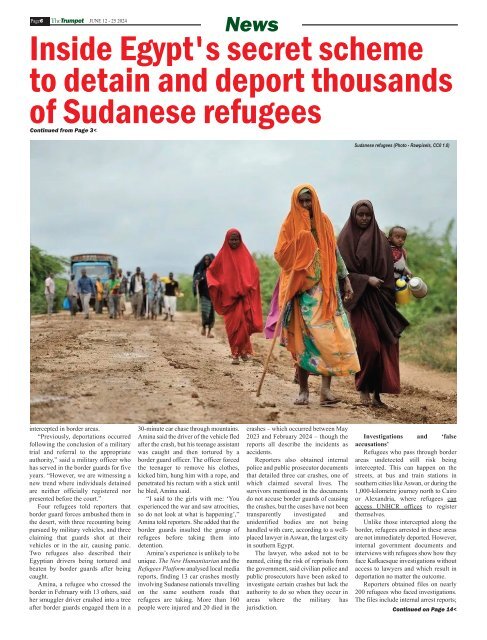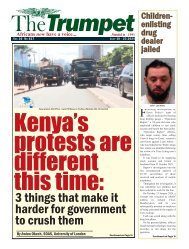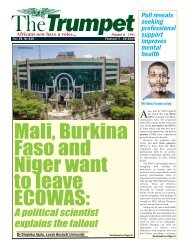The Trumpet Newspaper Issue 625 (June 12 - 25 2024)
Inside Egypt's secret scheme to detain and deport thousands of Sudanese refugees
Inside Egypt's secret scheme to detain and deport thousands of Sudanese refugees
Create successful ePaper yourself
Turn your PDF publications into a flip-book with our unique Google optimized e-Paper software.
Page6 <strong>The</strong><strong>Trumpet</strong> JUNE <strong>12</strong> - <strong>25</strong> <strong>2024</strong><br />
News<br />
Inside Egypt's secret scheme<br />
to detain and deport thousands<br />
of Sudanese refugees<br />
Continued from Page 3<<br />
Sudanese refugees (Photo - Rawpixels, CC0 1.0)<br />
intercepted in border areas.<br />
“Previously, deportations occurred<br />
following the conclusion of a military<br />
trial and referral to the appropriate<br />
authority,” said a military officer who<br />
has served in the border guards for five<br />
years. “However, we are witnessing a<br />
new trend where individuals detained<br />
are neither officially registered nor<br />
presented before the court.”<br />
Four refugees told reporters that<br />
border guard forces ambushed them in<br />
the desert, with three recounting being<br />
pursued by military vehicles, and three<br />
claiming that guards shot at their<br />
vehicles or in the air, causing panic.<br />
Two refugees also described their<br />
Egyptian drivers being tortured and<br />
beaten by border guards after being<br />
caught.<br />
Amina, a refugee who crossed the<br />
border in February with 13 others, said<br />
her smuggler driver crashed into a tree<br />
after border guards engaged them in a<br />
30-minute car chase through mountains.<br />
Amina said the driver of the vehicle fled<br />
after the crash, but his teenage assistant<br />
was caught and then tortured by a<br />
border guard officer. <strong>The</strong> officer forced<br />
the teenager to remove his clothes,<br />
kicked him, hung him with a rope, and<br />
penetrated his rectum with a stick until<br />
he bled, Amina said.<br />
“I said to the girls with me: ‘You<br />
experienced the war and saw atrocities,<br />
so do not look at what is happening’,”<br />
Amina told reporters. She added that the<br />
border guards insulted the group of<br />
refugees before taking them into<br />
detention.<br />
Amina’s experience is unlikely to be<br />
unique. <strong>The</strong> New Humanitarian and the<br />
Refugees Platform analysed local media<br />
reports, finding 13 car crashes mostly<br />
involving Sudanese nationals travelling<br />
on the same southern roads that<br />
refugees are taking. More than 160<br />
people were injured and 20 died in the<br />
crashes – which occurred between May<br />
2023 and February <strong>2024</strong> – though the<br />
reports all describe the incidents as<br />
accidents.<br />
Reporters also obtained internal<br />
police and public prosecutor documents<br />
that detailed three car crashes, one of<br />
which claimed several lives. <strong>The</strong><br />
survivors mentioned in the documents<br />
do not accuse border guards of causing<br />
the crashes, but the cases have not been<br />
transparently investigated and<br />
unidentified bodies are not being<br />
handled with care, according to a wellplaced<br />
lawyer in Aswan, the largest city<br />
in southern Egypt.<br />
<strong>The</strong> lawyer, who asked not to be<br />
named, citing the risk of reprisals from<br />
the government, said civilian police and<br />
public prosecutors have been asked to<br />
investigate certain crashes but lack the<br />
authority to do so when they occur in<br />
areas where the military has<br />
jurisdiction.<br />
Investigations and ‘false<br />
accusations’<br />
Refugees who pass through border<br />
areas undetected still risk being<br />
intercepted. This can happen on the<br />
streets, at bus and train stations in<br />
southern cities like Aswan, or during the<br />
1,000-kilometre journey north to Cairo<br />
or Alexandria, where refugees can<br />
access UNHCR offices to register<br />
themselves.<br />
Unlike those intercepted along the<br />
border, refugees arrested in these areas<br />
are not immediately deported. However,<br />
internal government documents and<br />
interviews with refugees show how they<br />
face Kafkaesque investigations without<br />
access to lawyers and which result in<br />
deportation no matter the outcome.<br />
Reporters obtained files on nearly<br />
200 refugees who faced investigations.<br />
<strong>The</strong> files include internal arrest reports;<br />
Continued on Page 14
















